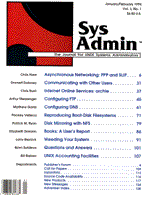
Listing 2: nsupdate shell
#!/bin/sh # # # this script builds the file master.out (the SOA for sinag.com) # (actully the only real change that ever takes place is the # updated serial number -- it's based on the date) # # mrg 7/15/91 # config=./ns.config seqfile=`cat $config | grep "^seq" | cut -d= -f2` output=`cat $config | grep "^output" | cut -d= -f2` origin=`cat $config | grep "^origin" | cut -d= -f2` authns=`cat $config | grep "^authns" | cut -d= -f2` authaddr=`cat $config | grep "^authaddr" | cut -d= -f2` contact=`cat $config | grep "^contact" | cut -d= -f2` refresh=`cat $config | grep "^refresh" | cut -d= -f2` retry=`cat $config | grep "^retry" | cut -d= -f2` expire=`cat $config | grep "^expire" | cut -d= -f2` minimum=`cat $config | grep "^minimum" | cut -d= -f2` include=`cat $config | grep "^include" | cut -d= -f2` if [ -f ! $seqfile ] then echo 'Error !!!! the nameseq file is missing....' exit fi set `date`; m=$2 y=$6 d=$3 # Make the month a numeric number case $m in Jan*) m=01 ;; Feb*) m=02 ;; Mar*) m=03 ;; Apr*) m=04 ;; May*) m=05 ;; Jun*) m=06 ;; Jul*) m=07 ;; Aug*) m=08 ;; Sep*) m=09 ;; Oct*) m=10 ;; Nov*) m=11 ;; Dec*) m=12 ;; *) m=-1 ;; esac # Convert the single digit days into 2 digit numbers (ie, add a leading zero) case $d in 1) d=01;; 2) d=02;; 3) d=03;; 4) d=04;; 5) d=05;; 6) d=06;; 7) d=07;; 8) d=08;; 9) d=09;; esac # subtract 1900 from the year.... y=`expr $y - 1900` cur_date=$y$m$d # there is a file called 'nameseq' which should be in the current # directory. It's a one line file that contains the last date (yymmdd) # and the last sequence for that date (0-99). We now need to read that # file. If the last date is different from today's, the sequence is set # to zero, and the new date is used. If the date is the same (ie, running # it more than once on the same day) we just increase the sequence number # # At the end, I re-write the 'nameseq' file back out. set `cat $seqfile`; dateseq=$1; seq=$2 if [ $cur_date -le $dateseq ] then seq=`expr $seq + 1` else dateseq=$cur_date seq=0 fi case $seq in 0) seq=00;; 1) seq=01;; 2) seq=02;; 3) seq=03;; 4) seq=04;; 5) seq=05;; 6) seq=06;; 7) seq=07;; 8) seq=08;; 9) seq=09;; esac # rewrite the 'nameseq' file back out echo $dateseq $seq > $seqfile echo the date_seq is $dateseq and the seq is $seq # All of these variables are going to be inserted into the named.boot # file on the primary nameserver. echo ';' > $output echo '; this file was created on' `date` >> $output echo ';' >> $output echo '; Authoritative data for the ' $origin ' domain ' >> $output echo ';' >> $output echo '; For more information, contact:' >> $output echo '; sysadmin: ganis@draco' >> $output echo ';' >> $output echo '$origin' $origin >> $output echo $origin ' IN SOA ' $authns $contact ' ( ' >> $output echo ' ' $dateseq$seq ' ; serial ' >> $output echo ' ' $refresh ' ; refresh time ' >> $output echo ' ' $retry ' ; retry on failure ' >> $output echo ' ' $expire ' ; expire data ' >> $output echo ' ' $minimum ') ; minimum ' >> $output echo $origin ' IN NS ' $authns >> $output echo $authns ' IN A ' $authaddr >> $output echo '$''include ' $include >> $output echo echo 'the new master files are in place.' echo echo 'should the named deamon be refreshed (y|n) ?' read answer if [ $answer = 'y' ] then kill -HUP `cat /etc/named.pid` fi
|